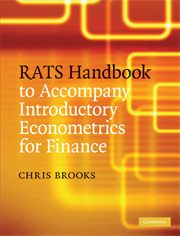Book contents
- Frontmatter
- Contents
- List of figures
- List of screenshots
- Preface
- 1 Introduction
- 2 The classical linear regression model
- 3 Further development and analysis of the classical linear regression model
- 4 Diagnostic testing
- 5 Formulating and estimating ARMA models
- 6 Multivariate models
- 7 Modelling long-run relationships
- 8 Modelling volatility and correlation
- 9 Switching models
- 10 Panel data
- 11 Limited dependent variable models
- 12 Simulation methods
- Appendix: sources of data in this book
- References
- Index
11 - Limited dependent variable models
Published online by Cambridge University Press: 05 June 2012
- Frontmatter
- Contents
- List of figures
- List of screenshots
- Preface
- 1 Introduction
- 2 The classical linear regression model
- 3 Further development and analysis of the classical linear regression model
- 4 Diagnostic testing
- 5 Formulating and estimating ARMA models
- 6 Multivariate models
- 7 Modelling long-run relationships
- 8 Modelling volatility and correlation
- 9 Switching models
- 10 Panel data
- 11 Limited dependent variable models
- 12 Simulation methods
- Appendix: sources of data in this book
- References
- Index
Summary
There are many situations in financial research where it is the explained variable rather than one or more of the explanatory variables that is qualitative. The qualitative information would then be coded as a dummy variable and the situation would be referred to as a limited dependent variable and needs to be treated differently. The term refers to any problem where the values that the dependent variables may take are limited to certain integers (e.g. 0, 1, 2, 3, 4) or even where it is a binary number (only 0 or 1).
The linear probability model (LPM) is by far the simplest way of dealing with binary dependent variables, and it is based on an assumption that the probability of an event occurring is linearly related to a set of explanatory variables. The actual probabilities cannot be observed, so we would estimate a model where the outcomes, yi (the series of zeros and ones), would be the dependent variable. This is then a linear regression model and would be estimated by OLS. The set of explanatory variables could include either quantitative variables or dummies or both. The fitted values from this regression are the estimated probabilities that yi = 1 for each observation i.
The linear probability model has many important flaws and consequently the logit and probit approaches are used instead. Both models are able to overcome the limitation of the LPM that it can produce estimated probabilities that are negative or greater than one.
- Type
- Chapter
- Information
- RATS Handbook to Accompany Introductory Econometrics for Finance , pp. 168 - 174Publisher: Cambridge University PressPrint publication year: 2008



